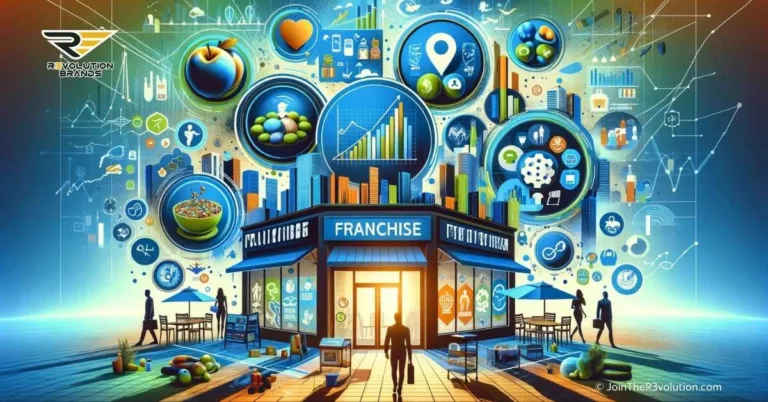In an era where climate change and environmental sustainability are at the forefront of global concerns, businesses are under increasing pressure to adopt eco-friendly practices and contribute positively to the planet. One promising trend that has emerged in recent years is the rise of “Green Franchises.”
These franchises, which prioritize environmentally friendly practices and products, are gaining momentum as they align with both consumer demand for sustainable choices and the necessity for businesses to reduce their carbon footprint.
The Green Franchise Movement
The concept of franchising has been around for centuries, providing individuals with the opportunity to own and operate their businesses while leveraging the established brand, support, and resources of a parent company.
Traditionally, franchises have been associated with industries like fast food, retail, and hospitality. However, in response to growing environmental concerns, a new wave of franchises has emerged that focuses on sustainability and eco-conscious practices.
These are the Green Franchises that are reshaping the business landscape.
Why Green Franchises Are Gaining Momentum
- Meeting Consumer Demand: Consumers are becoming increasingly conscious of their environmental impact and are seeking out products and services that align with their values. Green Franchises capitalize on this trend by offering sustainable and eco-friendly alternatives. Whether it’s a green cleaning service, an organic food franchise, or a renewable energy company, these businesses are tapping into a growing market of environmentally aware consumers.
- Regulatory and Policy Support: Governments and regulatory bodies worldwide are implementing stricter environmental regulations and incentives for businesses to reduce their carbon footprint. This has created a favorable environment for Green Franchises, as they are often more compliant with these regulations from the start, reducing the risk of fines and legal issues.
- Cost Savings: Going green is not just about being environmentally responsible; it’s also about being financially savvy. Many Green Franchises adopt energy-efficient technologies, waste reduction strategies, and sustainable sourcing practices, all of which can lead to significant cost savings over time. As a result, these franchises are not only good for the planet but also for the bottom line.
- Attracting Top Talent: In today’s job market, many employees are looking for more than just a paycheck. They want to work for companies that share their values and have a positive impact on society. Green Franchises are often seen as more attractive employers, making it easier for them to attract and retain top talent.
Examples of Green Franchises
Now, let’s take a closer look at some real-world examples of Green Franchises that are leading the charge in sustainability:

- The Green Cleaning Revolution: Cleaning businesses have embraced eco-friendly practices, offering green cleaning products and methods.
- Organic Food Franchises: As the demand for organic and locally sourced food continues to grow, franchises have emerged, providing consumers with convenient access to healthier and more sustainable food options.
- Renewable Energy Franchises: In the quest for cleaner energy sources, franchises in the renewable energy sector have flourished.
- Eco-Friendly Home Improvement: Green franchises also extend into the home improvement industry. Brands focus on providing sustainable plumbing solutions, while others offer environmentally friendly insulation options for homeowners.
- Sustainable Transportation: With the growing interest in electric vehicles (EVs), franchises are capitalizing on the shift towards sustainable transportation options, offering rental services exclusively for electric and hybrid vehicles.
The Benefits of Green Franchises
- Reduced Environmental Impact: One of the most obvious benefits of Green Franchises is their positive impact on the environment. By adopting sustainable practices and offering eco-friendly products and services, these franchises contribute to reducing pollution, conserving resources, and mitigating climate change.
- Stronger Brand Image: Green Franchises are often seen as socially responsible and forward-thinking businesses. This positive brand image can lead to increased customer loyalty and trust, as well as a competitive edge in the market.
- Financial Stability: The emphasis on cost-saving measures, energy efficiency, and waste reduction can make Green Franchises more financially stable in the long run. They are better equipped to weather economic downturns and market fluctuations.
- Community Engagement: Green Franchises often engage with their local communities by participating in environmental initiatives, sponsoring eco-friendly events, and supporting local sustainability efforts. This involvement fosters a sense of community and goodwill.
- Personal Fulfillment: For franchisees, owning a Green Franchise can be personally fulfilling. Many individuals are drawn to these businesses because they align with their own values and beliefs, giving them a sense of purpose beyond financial success.
Challenges Faced by Green Franchises
While the benefits of Green Franchises are substantial, they are not without their challenges. Here are some common obstacles these businesses may encounter:
- Initial Investment: Some Green Franchises may require a higher initial investment compared to traditional franchises. The cost of eco-friendly technologies, sustainable materials, and certifications can add to the startup expenses.
- Consumer Education: Educating consumers about the benefits of green products and services can be a challenge. Green Franchises often need to invest in marketing and outreach to inform potential customers about their eco-friendly offerings.
- Supply Chain Sustainability: Ensuring a consistent supply of sustainable materials and products can be challenging, especially if the franchise operates in regions where eco-friendly options are limited.
- Competitive Market: As the demand for sustainable products and services grows, more players enter the market, increasing competition. Green Franchises must continuously innovate and differentiate themselves to stay ahead.
- Changing Regulations: Environmental regulations can vary from one region to another and are subject to change. Keeping up with evolving regulations can be a complex task for Green Franchises.
The Path Forward for Green Franchises
Despite the challenges, Green Franchises are well-positioned to play a pivotal role in the future of business sustainability. Here are some strategies that can help them thrive:
- Innovation and Differentiation: Green Franchises should continue to innovate and differentiate themselves in the market. This can involve staying up to date with the latest sustainable technologies and practices, as well as developing unique product offerings.
- Collaboration and Networking: Collaboration within the green business community can be beneficial. By forming partnerships and networks with other eco-conscious organizations, Green Franchises can amplify their impact and share resources.
- Consumer Education: Invest in consumer education to raise awareness about the environmental benefits of choosing green products and services. This can include marketing campaigns, educational events, and partnerships with environmental organizations.
- Adaptability: Stay flexible and adaptable to changing regulations and market dynamics. Being able to pivot quickly in response to new environmental policies or emerging trends is crucial for long-term success.
- Sustainability Reporting: Consider implementing sustainability reporting and transparent communication practices. Providing evidence of your commitment to environmental responsibility can build trust with customers and investors.
Green Franchises Are the Future
Green Franchises represent a promising avenue for businesses to embrace sustainability and contribute to a greener future. As consumer demand for eco-friendly options continues to rise, these franchises offer a unique opportunity to meet that demand while making a positive impact on the planet.
By navigating the challenges, staying innovative, and fostering a commitment to environmental responsibility, Green Franchises can indeed be the future of business sustainability.
As the world confronts the urgent need for environmental stewardship, these franchises may well lead the way toward a more sustainable and prosperous future for all.





